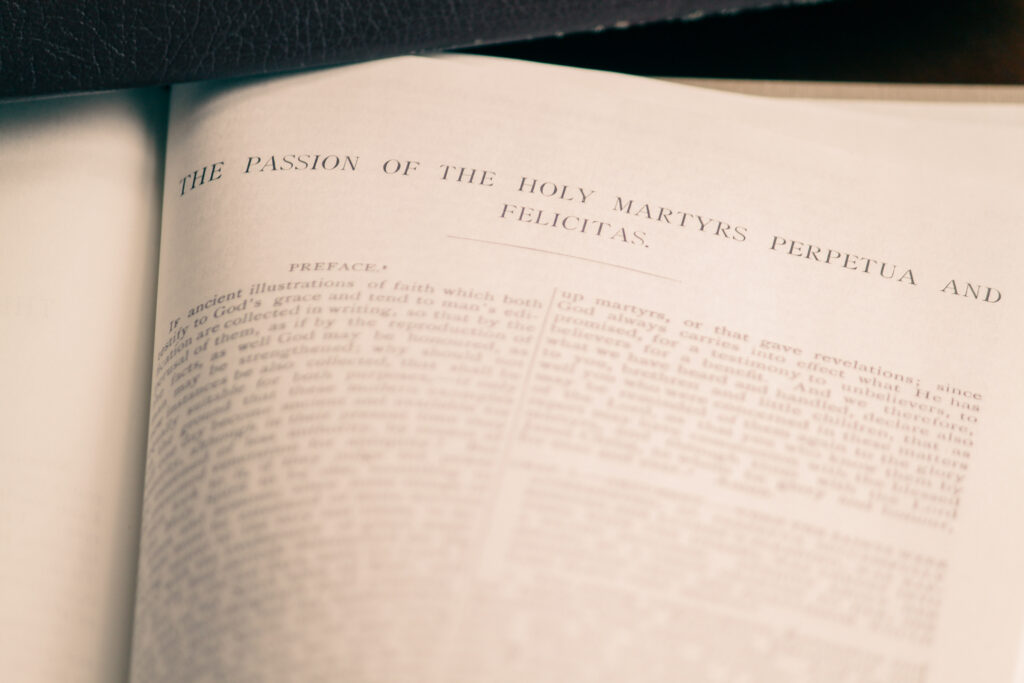
Tradition
As we mentioned in the full post about the third century martyrs Perpetua and Felicitas, the diary of Perpetua has survived the centuries and is available for Christians to read today, making it one of the earliest Christian texts. Therefore, the best way to remember these saints might just be to read the account itself, and what better time than when the commemoration of Saints Perpetua and Felicity falls on March 7th. In most years, this day falls during Lent (the latest date for Ash Wednesday being March 10th), so if you are still looking for a saint’s biography to read this Lent, consider adding this short diary of Perpetua to your list. The account of their unwavering allegiance to Christ is no doubt a difficult story to read, and some discretion should be used around children, but in it we have the examples of Christians who uphold their vows to Christ even in the face of persecution, shunning everything for the sake of their Lord.
Perpetua’s story begins when she is already in the jail because of her persecutors. A brief introduction explains that she along with the four other catechumens were apprehended, Felicitas included. It follows with her days in the jail including three visions: the first that she will indeed die, the second revealing that she will fight with the devil himself, and the third that she will be carried to the throne of God. She is met several times by her father, distraught at the thought of losing his daughter and her infant losing his mother. Finally, they enter the arena and meet their end after an encounter with the beasts, Perpetua showing modesty and dignity to the very last.
On the Reading
Once again, give the account a pre-read before including children. Decide which portions might be important to keep and which parts can be reserved for later. In particular, Perpetua’s famous opening paragraph with her father is an important point: “I cannot call myself by any other name than what I am—a Christian.” This confession sets the scene for all that she and Felicitas are willing to give up as a Christians, even father and child. In the initial paragraphs of the final chapter (before any detail of the animals is given), the eyewitness describes the composure of the catechumens who “rejoiced that they should have incurred any one of their Lord’s passions.” This vision is at the heart of the martyrs’ motivation: their love for the Lord strengthens them, and he doesn’t desert them in their own sufferings.
It is important to remember that while the early Church martyrdom accounts are historical, they not written primarily for the purpose of producing a factual historical account. They were written—the story of Perpetua and Felicitas or the martyrdom of Polycarp, to give another example—to give a Christian witness for spiritual edification and piety. Even if Perpetua penned this diary, it was finished by an eyewitness who likely held a certain vision for how it would encourage and strengthen Christians. Moreover, the Passion was edited years later (possibly by Tertullian), who held his own theological inclinations, some of which have been debated. In all, it is a fitting read for Christians to peek into the lives of early Christians whose faith did cost them everything on earth and edifying literature for the Lenten season.
The final paragraph and prayer ends the account beautifully:
“O most brave and blessed martyrs! O truly called and chosen unto the glory of our Lord Jesus Christ! whom whoever magnifies, and honours, and adores, assuredly ought to read these examples for the edification of the Church, not less than the ancient ones, so that new virtues also may testify that one and the same Holy Spirit is always operating even until now, and God the Father Omnipotent, and His Son Jesus Christ our Lord, whose is the glory and infinite power for ever and ever. Amen.”
Sources:
1. The Passion of the Holy Martyrs Perpetua and Felicity. Translated by R.E. Wallis. From Ante-Nicene Fathers, Vol. 3. Edited by Alexander Roberts, James Donaldson, and A. Cleveland Coxe. (Buffalo, NY: Christian Literature Publishing Co., 1885.) Revised and edited for New Advent by Kevin Knight. <http://www.newadvent.org/fathers/0324.htm>.

